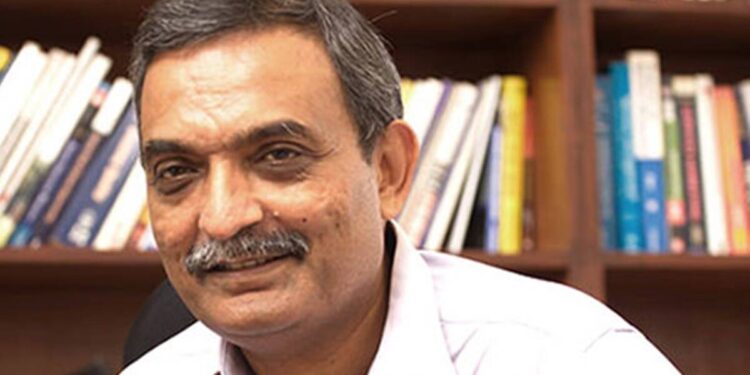 Prof Janat Shah, director, IIM Udaipur
Prof Janat Shah, director, IIM UdaipurFor over more than half a century the Indian Institutes of Management have established an enviable record of quality and accomplishment. In less than 10 years since it was founded, IIM Udaipur has built on this legacy. This young IIM aspires to be a world-class management school creating global knowledge, with a focus on ‘digital’. “We hope to position ourselves as an institute that creates managers who truly understand technology,” says Prof Janat Shah, director, IIM Udaipur. In an interview with FE’s Vikram Chaudhary, he adds that IIM Udaipur gained AACSB accreditation in November 2018, and has been listed on the QS 2020 Masters in Management Rankings as well as the Financial Times Master in Management Ranking 2019, becoming the youngest B-school in the world on both these rankings. Excerpts:
Being a relatively smaller IIM, was it easy to shift to the online mode of education delivery during the lockdown last year?
We are younger, but not necessarily smaller. IIM Ahmedabad and IIM Bangalore would probably be 1.5 times our numbers, but not significantly larger. The new-age IIMs have scaled up quite fast.
Our campus is student-centric. Last year when we shifted online we had a call with our students and I made a promise that we will make sure online education delivery would be comparable, if not better, to physical classroom. As we look back, we feel we have delivered on that promise.
Did you have any students who lacked hardware (laptops, internet connectivity, etc) for online learning? How did you support them?
Students who come to management institutes usually have a laptop, and all our students had one. The challenge was the bandwidth issue at some places—for such students we sent videos (of lectures etc). As India started opening up gradually last year in September, we allowed students (who wanted to come) on the campus. Even though classes were being held online, they were able to use campus connectivity (all new IIM campuses have invested heavily in connectivity). By January this year we had about 75% students on the campus.
Also, while the regular faculty gets digital devices, we gave every visiting faculty an iPad.
How have been your placements like during the pandemic academic year?
There were, of course, apprehensions. The first was with the economy shrinking what happens to jobs, and the second was that the market (those who hire) may be sceptical about this batch that has studied online. But we found we have done extremely well. For our one-year MBA (Global Supply Chain Management) we completed placement a month before the convocation. For quite some time we have been working on industry connect, which also helped.
With the second wave, and possibly a third, do you think the future of higher education delivery has been changed forever? Is online education delivery sustainable for a management institute?
On your question on online education delivery being sustainable, my honest answer is ‘no’. We have done a lot of brainstorming and we feel that our premier programmes will be campus-based and face-to-face, but we will use technology to enhance that learning experience. In management education, active discussion and debate is part of the learning process. At the same time, we found that there are certain advantages of online learning; we found some students who would otherwise not have spoken much in a physical classroom were quite vocal in the online classroom.
For executive education, I see the future as hybrid, i.e. a mix of online plus physical.
Some IIMs focus on unique areas (for example, more than half of IIM Kozhikode students are female). Does IIM Udaipur also have any focus areas?
We have the Vision 2030, and the two core areas we are focusing on are high-quality research and student transformation. We also want to lead in how digital technology is changing the business world by preparing our students with management concepts and leadership styles. We recently launched India’s only one-year MBA in Digital Enterprise Management for experienced professionals. By 2030, ‘digital’ will give us a unique identity. Going forward, all companies will need managers who understand technology. That’s where we hope to position ourselves—as an institute that creates manages who understand technology. That is what will give us a distinct identity.
How do you view university rankings?
For an educational institute, it’s wrong to chase rankings. Instead, you should use rankings as a feedback on how well you are doing in one area or another.
For example, the UT Dallas ranking on research, which has created a database to track publications in 24 leading business journals. It’s a transparent ranking, and tells me how my performance has been as far as contributing to top business journals is concerned. I can see where I stand with respect to others. A ranking should give you feedback to drive your own strategy.
How do you view the NEP’s proposal to allow top 100 foreign universities to set up campuses in India?
Inviting foreign is institutes to India is good for students, and whatever is good for our students we should do it. It will create more competition amongst institutions and is a great idea. Education has been under too much regulation, and foreign universities coming to India may also help relax that regulation a little bit.
Get live Stock Prices from BSE, NSE, US Market and latest NAV, portfolio of Mutual Funds, Check out latest IPO News, Best Performing IPOs, calculate your tax by Income Tax Calculator, know market’s Top Gainers, Top Losers & Best Equity Funds. Like us on Facebook and follow us on Twitter.
![]() Financial Express is now on Telegram. Click here to join our channel and stay updated with the latest Biz news and updates.
Financial Express is now on Telegram. Click here to join our channel and stay updated with the latest Biz news and updates.














